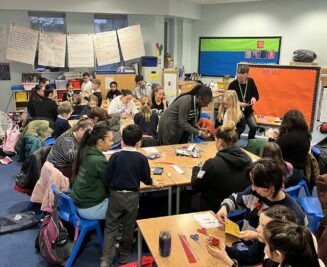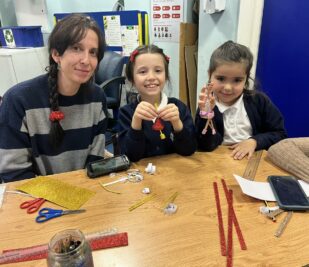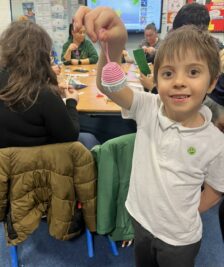Who is IQM?
IQM is the only national inclusion award in the UK. For over 20 years and in over 20 countries, schools, MATs and Local Authorities use the Inclusion Quality Mark to recognise exemplary inclusive practice.
Get in touch for your FREE school information pack today.
Brook House Primary Achieves Flagship Status
December 13, 2023
Brook House Primary School has achieved the Inclusive School Award with Flagship status.

Gone From Strength to Strength
Our Assessor said it was a great pleasure to visit the school once again. They had last visited the school three years previously to carry out its initial IQM Assessment. It is fair to say the school has gone from strength to strength during that time. An important part of that journey was their Ofsted inspection in the last week of the summer holidays which graded the school outstanding in all areas.

The Executive Head is now very much involved in the LAT, oversees two schools, and has taken particular responsibility for the Trust’s curriculum development among other things. The curriculum is something he is very proud of, and it was spoken about in some detail during the first meeting of the day. The Executive Head joined our Assessor (via a video link), the Head of School, and the new Deputy Head for the first meeting of the day.
The last time our Assessor visited the school the Head of School was a fairly new Deputy Head. He had been an Assistant Head in another school for over five years when he came to Brook House as Deputy Head. However, he found himself in, ‘the hot seat’ after one year when the original Head went on to become an Executive Head and took on a range of other responsibilities. Our Assessor was told that this was an expectation within the Trust. Once you have shown you are able and willing to take up the role of headship, it is likely to happen in one of the Trust schools if a vacancy arises.
The Executive Head explained that his role has evolved, and is still evolving, as he provides ‘executive’ support for the Head of School at Brook House and other schools. However, as the Head of School is confident and is doing a very good job, he (as Executive Head) can be less hands-on and can concentrate on other Trust-wide issues. He still has oversight of the school and he line manages the Head of School. He spends a few days a week in Brook House and still knows what is happening in every aspect of the school.
Curriculum Can Be Adapted
The Lion Trust Curriculum has been a very big piece of work that has happened over a number of years and is implemented across all the Lion Trust Schools. It has now been ‘commercialised’ and has been purchased and implemented in seven schools who are not within the Trust. The curriculum goes from Reception right up to Year 6 and can be adapted for all learners. He also (with others in the Trust) offers consultancy in all areas from finance to curriculum, pedagogy, and inclusion amongst other subjects. They run various Show Case Events. The Executive regularly speaks at conferences. The school was recently awarded the ‘Leading Parent Partnership Award’. This is increasingly significant as there are many vulnerable families and many in temporary accommodation that need additional support. The school uses Pupil Premium Funds (PPF) to pay the travel costs for parents and children when they move out of the area temporarily but want to stay at the school. They also use PPF to support disadvantaged children in a variety of ways.
Brook House Primary is fully staffed with qualified teachers and support staff. The Executive said that employing teachers has never been an issue because they train their own. One of these trainees (now a teacher) started as a mid-day supervisor. The ‘Grow Your Own’ policy has been very successful and many of the trainees already live in the local area, so do not have the same housing issues as others who come straight from university. There was only one new teacher this year. The school has signed up to the Wellbeing Charter and the Trust has given additional uplift in salaries. Appraisal is in place and those who qualify with good performance can gain double increment points. This is a Trust policy and has led to good retention of teachers. However, recruiting and retaining Learning Support Assistants (LSAs) and Teaching Assistants (TAs) is not as straightforward as they are now able to take up alternative roles in local supermarkets and elsewhere and earn more money with less responsibility. It is an issue for all schools, especially in inner-city areas
Beneficial

The Executive Head said that being part of the Lion Trust has been very beneficial to Brook House Primary School. All policies are centralised and whilst this can be a good thing as it saves time and additional work, it can mean that some policies are not appropriate in some schools and may need to be adjusted. The Heads of School from all the Lion Trust schools meet regularly and can have input into new policies and developments. They have benefitted particularly financially but still have some control over their own budget. There is a Finance Committee that approves bids put forward by individual schools. They also benefit from having a central team that can support the school on curriculum development, safeguarding, SEND and so on.
Our Assessor asked about the numbers of pupils in the Early Years (EY) as many schools have suffered from a reduced number of pupils arriving in nursery and reception as the local population has decreased. Many families have been moved out of London to cheaper areas and this has had an impact on school numbers. They were told that there is a new housing development next door to the school, and this should result in more pupils needing a school. Currently, the pupil numbers have been steady, and the school is heavily oversubscribed. The Local Authority would like them to increase to three forms of entry but there is very little room for expansion. The new building works next to the school may release a bit of land for the school to expand its very small playground but there is little space for other buildings. The school would like to open a nursery on-site.
Having said this, there is an issue around Planned Admission Number (PAN) reduction in the Borough and some local schools are reducing their numbers. The Executive Head believes this is because of the proactive marketing of the school. He says the schools go above and beyond what is expected from a school if it is a benefit to the child and family. The mobility rate is now less than 5% and he said mobility used to be 70% when the school first opened. They now have waiting lists of pupils wanting to join the school.
Trust the School
The Executive Head said that parents/carers generally trust the school to do right by their children. He said this can be a double-edged sword, as they often then leave everything to the school and (some) do not participate in home learning and other active strategies to support their child’s learning.
Attention then turned to the Head of School and his Deputy Head who has been in post since Easter. The Senior Leadership Team (SLT) also includes an Assistant Head (Inclusion) who is currently off on long-term sickness. A new development is the introduction of phase leaders who provide the Middle Leadership Team (MLT). Our Assessor was able to meet three of these later in the day. The Team is led by the Executive Head although the Head of School takes most of the responsibility for Brook House School. The Head and Deputy Head have formed a good working partnership, and both are very well respected by the Trust, staff at all levels and the parents/carers.
As the Assistant Head (Inclusion) was on long-term sick leave, the Head of School has taken on responsibility for SEN in her absence. He has access to support and guidance from a colleague who used to work at Brook House and is now a Head of School in another Lion Trust School. As an experienced and qualified Special Educational Needs Co-ordinator (SENCo), she is able to advise on provision and issues that arise with SEND children. There are currently 23 children with Education, Health and Care Plans (EHCPS).

The Head of School currently picks up the SEND issues with an experienced trained TA. The school is likely to train another member of staff to complete their SENCO training and will put it out to staff to apply even though they know of some who have already expressed an interest. The Head of School and Deputy Head are now looking at Section F regarding EHCPS for the highest needs pupils. They are still working to fully understand how SEN funding works. With this in mind, the Trust has organised a day’s training for all Trust schools with a SEN funding expert who will clarify what the funding should be and what questions they should be asking.
Trailblazers
Brook House Primary is involved in ‘Trailblazers’ who provide a pre-Child and Adolescent Mental Health (CAMHs) service and work with children and families. There is a school-based Art Therapist, through ConnectED, and a Parental Engagement Officer. They also work closely with the Early Help Team. Our Assessor was told the Social Care team in the Borough is getting stronger and the SEND team is also getting better. Representatives from the team now are regular attenders at the Haringey Heads Meetings and are currently developing a system where each school has an allocated social worker. This has yet to be embedded across the Borough.
The lead Designated Safeguarding Lead (DSL) is currently the Head of School although there is a plan to hand this over to his Deputy Head by half term. This is because he is new to the role. However, there is a safeguarding team of 11 who are trained to Level Three in Safeguarding and Child Protection. The Office Manager, the Parental Engagement, and Learning Mentors are part of the team. They use Safeguard software to record concerns and actions and there is a clear structure and process for tracking and managing concerns. The school has bought into a supervision service for the lead DSL for an hour every half-term and they have three hours for other members of the team to benefit from. Our Assessor suggested Solution Circles as a good way of using this supervision to reach all members of the team. The recent Ofsted inspection showed that safeguarding was efficient (they rarely say any more than that). However, our Assessor was told that they were impressed by their recording of concerns and actions taken. The Trust regularly review the Central Record and the safeguarding processes. There is one taking place next week.

The Trust operates a Review Process (every term) and looks at the ‘full picture’ of what is happening in the school. Following the outcomes of these reviews, the school leadership team produce an action plan and agrees on priorities going forward. The Head of School explainedthat they are free to decide on their own Continuing Professional Development (CPD) model and they aim to make it more personalised for staff and more about the school’s priorities.
Throughout the year, reading CPD is given to staff who aim to support children with the teaching of depth and mastery. The Trust has devised a reading progression document which helps teachers plan for pupils, so they are challenged. Reading fluency assessments take place every half term. Interventions for all abilities are planned to include pupils working at greater depth.
Excellent Resources
A discussion took place about the Lion Trust Core Curriculum that has been developed over the last three years and is now used in Trust schools. Our Assessor was told that all the objectives of each subject are mapped out for teachers and are accompanied by excellent resources. This makes life easier for teachers which is important in terms of workload. However, it can also remove any autonomy from teachers. The Head of School said that in his school, teachers are able to choose particular texts that are more appropriate for pupils in their contexts, and he said that the school maps out the objectives for their teachers. They find hooks for writing by trying to link these to local events, so they are relevant to pupils. Brook House School are the only school in the Trust that still celebrates Black History Month as the other schools say this is included in their overall curriculum. However, the parents/carers made it clear they did not want school to dilute Black History Month, so it remains in place.
Foundation subjects are taught in the afternoons and subjects are planned in the same way as core subjects and include resources to use. This supports workload issues as above and supports the need for sequencing and building on knowledge and skills. Teachers are now encouraged to start to be creative and to decide on their own entry and exit points to the planned curriculum, giving them some autonomy to decide what is best for the pupils in their class. In addition, pre-planned tasks are open to discussion and teachers do have the opportunity to bring about change if it is beneficial to pupils. The school has been able to increase teachers’ Planning, Preparation and Assessment (PPA) time to 15% this year rather than 10%. This is obviously welcomed by teachers and is a real indicator of the importance of staff wellbeing.
New Arrivals Are Carefully Inducted
Pupils are tracked very carefully, and assessments are conducted at least once per half-term. This seems to be rather extreme but is a Trust policy. Our Assessor was told the outcomes of the assessments inform planning. However, it is difficult to understand as planning is already done at Trust level. However, our Assessor assumes this refers to planning interventions.
New arrivals to the school particularly those who need EAL support, are assessed and are carefully inducted and have access to the correct provision by the end of the second week after arrival to ensure rapid and sustained progress.
The Head of School described the teacher planning process which involves teachers and their line manager attending a pre-PPA session which supports the planning of resources and activities. Therefore, teachers are carefully guided on what they need to be doing during their PPA time. Teachers have high expectations of all groups of pupils. These expectations are very much tied into the delivery of the Lion Trust Curriculum and pedagogy. Pedagogy is also directed and guided by the Lion Academy Trust (LAT) and the school says that “teachers consistently make use of a range of teaching strategies as outlined in the LAT teaching and learning handbooks”. Furthermore, the LAT provide a marking policy to be used in all its schools. This marking policy, “enables pupils to reflect on their learning and respond to next steps learning. This is built into the lessons which enables pupils to also be more assessment proficient. All children respond to adults’ feedback using a green pen showing a visible rapport having been established between teacher and child”.
All of these policies were discussed in some detail and, although they appear very restrictive in our Assessor’s view, there is no denying that the outcomes for pupils in all groups across the school are very good.
The Head of School is aware that in order to keep moving forward as a school he needs to support teachers in further improving the quality of teaching and he said that a lot of work is going on to improve the quality of teaching. They are looking at coaching as a way of achieving this, as well as personalised CPD and the pre-PPA meeting.

The wellbeing of pupils and staff is an important part of the school ethos. The school has achieved the Carnegie Mental Health for Schools Silver Award. There are trained Mental Health First Aiders available for pupils and staff. The Carnegie Quality mark enabled the school to audit its provision in this area and to produce a clear action plan about the way forward. For pupils, there is a ‘Fresh Start’ session every morning and every classroom has a pupil voice box, there is a counselling service available, and children can self-refer. Otherwise, teachers and leaders will refer them for support. Staff also have access to counselling and support services. The Head of School said that putting teachers/staff in charge of their own CPD is also positive for their wellbeing.
It was good to hear that the Head of School and Deputy Head have coaching from an external provider.
Next discussion turned to the behaviour and attitudes of pupils at Brook House Primary. Our Assessor’s tour of the school and being in the school all day indicated that behaviour is generally very good. The pupils and staff met with later confirmed this viewpoint. Our Assessor was told the approach is about positive reinforcement and is built on strong relationships and high expectations and the management of that. They use ARBOUR software to record House Points and children get points for every great thing they are spotted doing in the school day. Points are uploaded onto ARBOUR at the end of the day.
Values and Principals
The Brook House Five Ways are the cornerstone of the behaviour policy. They act as outlining clear values and principles in the school. The children know them very well and take them seriously. The reward system is centred around these values and teachers and support staff choose one child a week who has demonstrated one of these values consistently and they receive an award. The Five Ways are as follows: Kindness, Aspiration, Responsibility, Honesty, and Respect.
Behaviour at lunch time is sometimes problematic probably due to the very small playground where there is little space to work off excess energy. The school has been working closely with the mid-day supervisors to ensure they are able to manage the pupils more effectively. The Head of School told said it is very important that this group of staff are fully trained and included so they feel they belong and are part of the school. They need to know their contribution is valued and it is clear it is! The team came in for two days INSET at the start of the term and were part of it. It is about the way they speak to children and learn how to help them resolve issues that arise in the playground.

The school has been working with the Anchor Project on the Trauma Informed process and this is proving to be really significant for staff. They have identified case studies of different children who had trauma and attachment issues so they can understand the part trauma plays in children’s behaviour. The school use the Zones of Regulation and there has been a large emphasis on behaviour, particularly at lunch times. They have developed more play leaders and have planned activities outside in the playground to avoid problems. This approach has been very successful. Children know what is expected of them and do their very best to meet the high expectations of the school.
The Behaviour Policy is underpinned by a step system starting with a verbal warning (not recoded) and then, if no improvement, Step 1: A formal warning; Step 2: Self-Reflection – differentiated reflection sheets; Step 3: Additional self-reflection with time out in another class. All classrooms have a ‘calming table’ and staff are notified on ARBOUR; Step 4: A sanction such as missed free time, or a detention and parents might be called.
However, our Assessor was assured that the steps are modified and adapted for children who have particular problems and can’t always follow the rules. Children with particular SEND needs may side-step these steps altogether. Our Assessor did meet a very young child who was extremely dysregulated and who was refusing to follow any instructions and wandered in and out of the room. Staff were extremely sensitive in managing him and ensured he was safe and was not a danger to anybody else. Staff were able to calm him down and manage his behaviour as best they could. It was obvious that he would not be subjected to the different sanctions and steps as he was not in control of his own behaviour. Although this young pupil was an extreme example, our Assessor was assured that the policy is adapted and differentiated according to different children’s needs. It was clear the Head and Deputy both know the pupils very well and are able to model how to respond and support.
Attendance
Our Assessor asked about attendance which is still very high and is nearly back at pre-pandemic levels. There are good systems in place to support good attendance and our Assessor asked about the attendance awards displayed in the foyer of the school. They asked if these awards excluded children with medical needs or who were young carers and had other needs that affected their attendance and could achieve an attendance award. Again, our Assessor was told that there are grey areas and staff know the children well and can ensure that all children can be awarded.
Next was a meeting with three teachers who had recently been promoted to Phase Leaders. They talked about their experience working in the school and how they felt about having a prepared curriculum and resources along with a framework for the way they teach and assess pupils and so on. They told our Assessor that this makes their lives easier, and they can feedback about things that they think need changing and can use their own resources if they believe they will be better. They said that the LAT also provides a number of different toolkits to help them in their roles. These include: A Leadership toolkit; An Early Years Foundation Stage (EYFS) toolkit; A Maths toolkit; A computing toolkit.
They explained these are pathway documents that go alongside every policy or Trust document. Some of the group had joined the school as Newly Qualified Teachers (NQTs) and all were obviously very happy teaching in the school. They said the staff are united and very loyal to the school. They feel well supported by the Head of School and Deputy Head who are both very visible and approachable. They felt belonging to the LAT provided many opportunities that they might not have otherwise.
The teachers spoke about the personalised CPD programme, and said that there was a CPD session that day (after school) looking at and discussing what is working well and what might be better for the moderation documents. They work in phase and year teams and have a sort of workshop to go through where things are going and what needs changing. They spoke about the pre-PPA documents and process which they found useful. There is a template which they complete prior to the session that outlines what support they may need to do their planning. They have a 30-minute session just before PPA with their partner teacher and a phase leader or Deputy Head. This way no time is wasted and makes sure they know what they should be concentrating on.
In terms of autonomy, one teacher spoke about a lesson she had taught that used a very different resource set and activity that involved her taking a risk – especially as it was a day the Trust were doing a review. She was praised for being creative and taking a risk. They all agreed there is a lot of monitoring and checking and this can make them very anxious, but they said that leaders always find the time to talk things through and have a dialogue following an observation. They said they are confident to say, “I am struggling” and this is not held against them. Instead, they are given support. One teacher said that she had a difficult time last year (for various personal reasons) and was not performing at her best; however, she received a great deal of support during this time.

Our Assessor asked the teachers what they thought the next phase in the whole school development was and they agreed that they (the school) are good academically but now need to concentrate more on personal development. They said the school and Trust are keen to hear staff voices and there are regular surveys to gather their views. Also, senior staff are very approachable, and unions are present, active and welcomed. Our Assessor suggested to the Head of School that he organise some Staff Voice Focus groups (during some CPD time) to discuss a series of whole school questions and priorities. These should be chaired by one of the groups, (elected by them) and should have no senior leader present. This will encourage people to speak freely, and they can produce feedback from the group that can then be reviewed by senior leaders.
Next, was a meeting with two LSAs who had been working in the school for a number of years. They support children with EHCPs and those with learning difficulties (without an EHCP), and run writing and reading interventions, colourful semantics and others as needed. They work with groups of pupils that have been identified by the phase leaders.
They said they have training with the Assistant Head (Inclusion) leader every fortnight. They are usually class-based except when running interventions. They cover for each other when required and work with individual pupils and groups as required. The relationships with teachers are very good and they share their planning with them so they know what to expect and can be properly prepared. They also work with the Speech and Language Therapist (SLT), Educational Psychologist (EP) and Physiotherapists who come into the school regularly. They have had some training regarding EAL pupils.
The two LSAs said that their relationships with parents/carers are very good, and they meet the parents of the most vulnerable pupils (those with EHCPs) every morning and evening as they deliver and collect their children. They make sure they work hand-in-hand with parents as they know their children best.
Appraisal is in place for LSAs, and they are set four targets and have to upload appropriate evidence on the software provided. They both said they do feel valued especially by the Head of School and Deputy Head and their own inclusion leader. They also feel appreciated and valued by class teachers and by parents. The Head in particular, is very supportive of them and values them for what they contribute. Both he and the Deputy Head always come to thank them for going beyond their regular duties.
There is no meeting of all LSAs together except during In-Service Education and Training (INSET) days and this means they do not get to meet with other colleagues on a regular basis and they were not able to tell me how many LSAs there are in the school. It would be much appreciated by the team if they had an opportunity to meet each other to share good practices and share what they are all doing with their colleagues on a more regular basis.
Pupil Voice

Pupil Voice is achieved through an effective School Council team across all year groups within the school. The children met with spoke about this and how it works. Meeting with pupils (six of them – Years 3 to 6) took place directly after lunch and they were full of energy and were happy to talk about their experience at school. Our Assessor started the meeting by asking them what the best things about Brook House School were. Their responses were as follows: Food is good; Teachers are really kind and sort things out for you; The playground is good and well-equipped… its small but fun; They give lots of homework that is set online plus worksheets (this was the view of one pupil only!); Saturday school for Year 6 pupils will start soon; Teachers teach you well; Pupils are friendly and I enjoy being at school.
They spoke about different leadership jobs they can apply for including playground ambassadors, IT ambassadors and so on. There is something for everyone, but they have to apply. They said they had all applied and were waiting for feedback to see what roles they would be given. They spoke about the School Council, how they are elected by classmates and about the job they do. They said it is all about bringing about change and they like to be involved in discussions even if they do not always get what they want. They were very proud that the new playground equipment was a result of discussions they (The School Council) had had in Year 4.
The pupils were able to explain how the school helped them deal with their anxiety and get them ready for life after Brook House School. They knew all about Personal, Health, and Social Education (PHSE) which they said helped them understand their feelings and emotions, especially in early years. Then it moved on to dealing with peer pressure and finally covered puberty in Years 5 and 6. They said assemblies and PHSE were the main ways that these sorts of topics were discussed.
Pupils said they felt very safe at school, and it was rare for lessons to be disrupted by poor behaviour. They understood that some pupils have problems and have particular needs, but they are always managed well by staff. They knew all about the Five Ways and are totally signed up for them! They all knew them and could recite them by rote. They also knew the behaviour (sanction) steps and could tell when different steps might come into play.
The children really enjoy the Friday celebration assemblies and the ‘Golden Book’ where teachers can add their names if they are doing something very well. There is one for different year groups. The reward for the whole class getting in the Golden Book is they get to go to the Target Room at lunch time where there are games and a PS5 that they can play on. They also said they get Attendance Rewards – extra break time and popcorn! Another popular reward was the Teacher’s Prize Box – if you do particularly well you get a small prize! They can also have their name put on the school raffle ticket, where they can win big prizes. Pupils also mentioned the many after-school clubs they can join at Brook House Primary.
Calm and at Work

After the initial meeting with the Executive Head and Head of School, our Assessor went on a long tour of the school with the Deputy Head. The school was found to be calm and at work. Children were getting on with their learning and classrooms were well organised and stimulating. Classrooms include washing lines that are used as working walls and key vocabulary, questions and key concepts for each term’s learning are displayed.
Behaviour around the school is excellent and children seemed to be comfortable and relaxed in the school environment. Indeed, the children spoken to confirmed they felt safe and secure at school. They felt there was always someone they could talk to if they were in trouble or were worried about something. Children move around the school in silence which our Assessor was told is a school/Trust policy. There were a few dysregulated pupils in the corridors, but they were being supported by staff who managed to get them back to class or to a place where they could work one-to-one with the LSA. On some occasions, the Head of School and Deputy Head were able to intervene and support these pupils. There were areas set aside in alcoves and parts of the corridors where interventions take place. There were also a number of intervention rooms.
Find out more about the IQM Inclusive School Award
If your school is interested in obtaining the IQM Inclusive School Award or you wish to talk to a member of the IQM team please telephone:
028 7127 7857 (9.00 am to 5.00 pm)
or email: admin@iqmaward.com for further details.
Want more information on the IQM Award? Click here to request your free IQM information pack.
Other Posts

About IQM
The only national award for inclusion in the UK, IQM has been committed to recognising exemplary inclusive schools for over 20 years and in over 20 countries around the world. The three awards allow schools and organisations to celebrate their inclusive practice against nationally recognised framework.
Site Links
© 2026 Inclusion Quality Mark | website developed & cared for by digidoda


